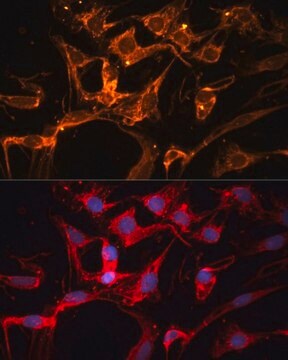SAB4200341
Anti-Golph3 (N-terminal) antibody produced in rabbit
~1.0 mg/mL, affinity isolated antibody
Sinonimo/i:
Anti-GOPP1, Anti-GPP34, Anti-Golgi peripheral membrane protein 1, 34 kDa, Anti-Golgi phosphoprotein 3 (coat-protein), Anti-Golgi-associated protein; Mitochondrial DNA absence factor, Anti-MIDAS
About This Item
Prodotti consigliati
Origine biologica
rabbit
Livello qualitativo
Coniugato
unconjugated
Forma dell’anticorpo
affinity isolated antibody
Tipo di anticorpo
primary antibodies
Clone
polyclonal
Forma fisica
buffered aqueous solution
PM
antigen ~34 kDa
Reattività contro le specie
mouse, human
Concentrazione
~1.0 mg/mL
tecniche
immunoprecipitation (IP): 5-10 μg using lysates of human HeLa cells
indirect immunofluorescence: 2.5-5.0 μg/mL using mouse 3T3 cells
western blot: 1-2 μg/mL using whole extracts of human HeLa cells
N° accesso UniProt
Condizioni di spedizione
dry ice
Temperatura di conservazione
−20°C
modifica post-traduzionali bersaglio
unmodified
Informazioni sul gene
human ... GOLPH3(64083)
mouse ... Golph3(66629)
rat ... Golph3(78961)
Descrizione generale
Immunogeno
Applicazioni
- immunoprecipitation
- immunofluorescence
- immunoblotting
Azioni biochim/fisiol
Stato fisico
Esclusione di responsabilità
Non trovi il prodotto giusto?
Prova il nostro Motore di ricerca dei prodotti.
Codice della classe di stoccaggio
10 - Combustible liquids
Punto d’infiammabilità (°F)
Not applicable
Punto d’infiammabilità (°C)
Not applicable
Certificati d'analisi (COA)
Cerca il Certificati d'analisi (COA) digitando il numero di lotto/batch corrispondente. I numeri di lotto o di batch sono stampati sull'etichetta dei prodotti dopo la parola ‘Lotto’ o ‘Batch’.
Possiedi già questo prodotto?
I documenti relativi ai prodotti acquistati recentemente sono disponibili nell’Archivio dei documenti.
Il team dei nostri ricercatori vanta grande esperienza in tutte le aree della ricerca quali Life Science, scienza dei materiali, sintesi chimica, cromatografia, discipline analitiche, ecc..
Contatta l'Assistenza Tecnica.